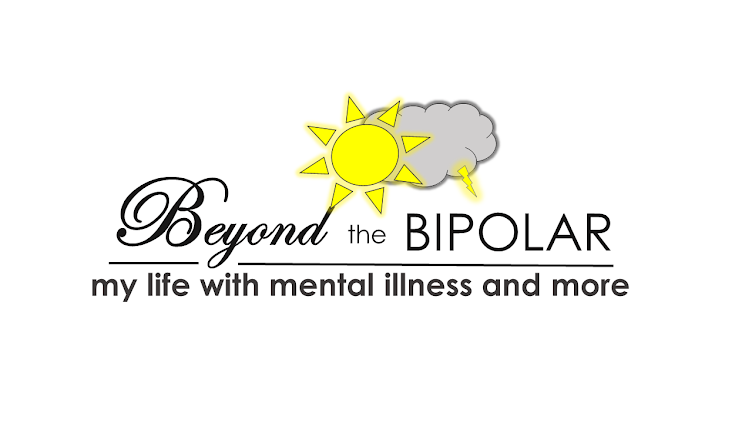Several years ago, on a sunshiny spring day as blossoms
began to fill the treetops, I pulled over to the side of the road because I
couldn’t see through my tears. The song playing on the radio was aggravating.
Pharrell crooned about being happy. All I could think was I am not happy! I
don’t know if I’ll ever be happy again! How dare you be happy?!
I angrily switched off the music, wiped my eyes, and
continued driving to my psychiatrist’s office.
One thing I’ve learned is that this illness often tricks me
into all or nothing thinking and everything (see what I did there?) seems
absolute. Circumstances seem like they’re either always or never. It’s hard for
me to recognize that as my mom likes to remind me, “This too shall pass. Maybe
like a kidney stone, but it will.”
For me, bipolar disorder also intensifies my feelings.
Instead of feeling sad, I feel despair. Instead of happiness I feel exuberance.
Instead of being slightly bugged or embarrassed, I feel so irritable and
annoyed with myself that I could almost climb out of my skin. Often though,
that all is so exhausting that I default to numb.
I was at an event last fall when I realized that numb is
where I usually am. A singer belted out a beautiful and emotional song. During
the last crescendo my heart melted in gratitude for actually feeling the yearning
that the song portrayed. The contrast to the numbness was stunning.
Music is powerful. It’s one of the secrets of the
psychiatric unit. Yep. As far as I know, the straightjackets are a myth. But
music therapy? That's real.
During music therapy, we all sat in a circle on chairs in a
mostly empty room (I'll tell you why in a later post). When I say we, I mean most of the patients
(you can skip it, but your progress looks better if you attend as many group
sessions as possible), some of the nurses and staff who monitored our behavior,
and the music therapist. The therapist asked us to close our eyes while we
listened to each song she played from her phone through a Bluetooth speaker.
She asked us to close our eyes while we listened. She played
just under ten songs—a variety of everything from Disturbed’s The Sound of
Silence to Claude Debussy’s Clair de Lune. I took Clair de Lune
as a little wink from my late maternal grandparents who listened to the record
of that song for their first date. After each song had played, we were to write
any emotions we had felt while listening.
Then, as any group in successful therapy does, we each
shared what we had written. One of the things that fascinated me was how
different each person’s reaction to each song was. Imagine Dragons’ Believer
extracted feelings such as disgust, motivation, boredom, and happiness—all
that from one song!
Colbie Callait is my go to for when I'm feeling good, but like
a lot of people, I have a lot of favorite tunes for different situations. Some
playlists are my cleaning soundtrack, and some are for roadtrips. Today, I’m
going to share my list of songs that I play when it’s all I can do to tap that
triangle button. I think that's the goal of music therapy--to help us realize
that turning on certain music can impact our mood, and we can use it to our
advantage.
These songs below are the ones that can pull me out of bed
when staying there isn’t an option. Why? Sometimes it’s the lyrics. Sometimes
is the beat, and sometimes it’s the memories. This One’s for the Girls
by Martina McBride reminds of the mornings I spent at the local nursing home in
my hometown curling white hair and painting nails on wrinkled hands. I Hope
You Dance takes me back to speaking at my high school graduation with the
feeling of elation in response to the opportunities ahead. I listen to My
Wish by Rascal Flatts and images of my first baby shower flip through my
head like pictures in a scrapbook.
The list isn't all country, though. It has a hefty dose of
musical numbers, and the last four are instrumental. Tell me what you think
number 20 should be.
- My Wish by Rascal Flats
- This One's for the Girls by Martina McBride
- I Hope You Dance by Lee Ann Womack
- A Million Dreams by Pink
- Don't Stop Believing by Journey
- Ain't No Mountain High Enough by Marvin Gaye and Tammi Terrell
- Skyscraper by Demi Lovato
- Here Comes the Sun by The Beatles
- What a Wonderful World by Louis Armstrong
- Beautiful Day by U2
- Let it Go from Frozen
- You Get What You Give by New Radicals
- How Far I'll Go from Moana
- A New Day Has Come by Celine Dion
- Dare you to Move by Switchfoot
- Sometimes When it Rains by Secret Garden
- Gabriel's Oboe from The Mission
- River Flows in You by Yiruma
- Cantata No. 208 (Sheep May Safely Graze) by Johann Sebastian Bach
And just so you know, I no longer despise Happy. Less than a year later, my
daughter started clapping along at Pharrell's instruction, and it was so dang
cute that I turned it on whenever I could--just to see her "feel like a
room without a roof." And guess what? It was contagious.


